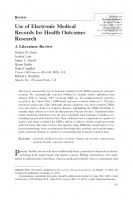Download
| File Size | 679.9 KiB |
|---|---|
| Date | August 25, 2015 |
| Downloads | 0 |
| Author | Bonnie B. Dean, Jessica Lam, Jaime L Natoli, Qiana Bulter, Daniel Aguilar, Robert J Nordyke |
This review assessed the use of electronic medical record (EMR) systems in outcomes research. We systematically searched PubMed to identify articles published from January 2000 to January 2007 involving EMR use for outpatient-based outcomes research in the United States. EMR-based outcomes research studies (n = 126) have increased sixfold since 2000. Although chronic conditions were most common, EMRs were also used to study less common diseases, highlighting the EMRs’ flexibility to examine large cohorts as well as identify patients with rare diseases. Traditional multivariate modeling techniques were the most commonly used technique to address confounding and potential selection bias. Data validation was a component in a quarter of studies, and many evaluated the EMR’s ability to achieve similar results previously achieved using other data sources. Investigators using EMR data should aim for consistent terminology, focus on adequately describing their methods, and consider appropriate statistical methods to control for confounding and treatment-selection bias.



